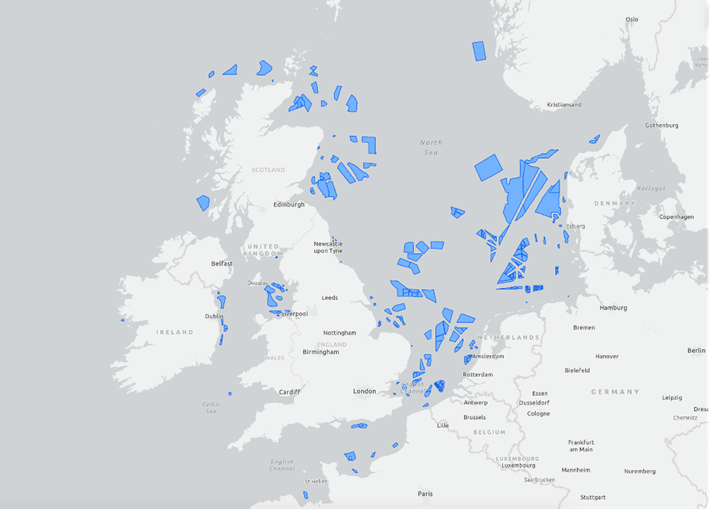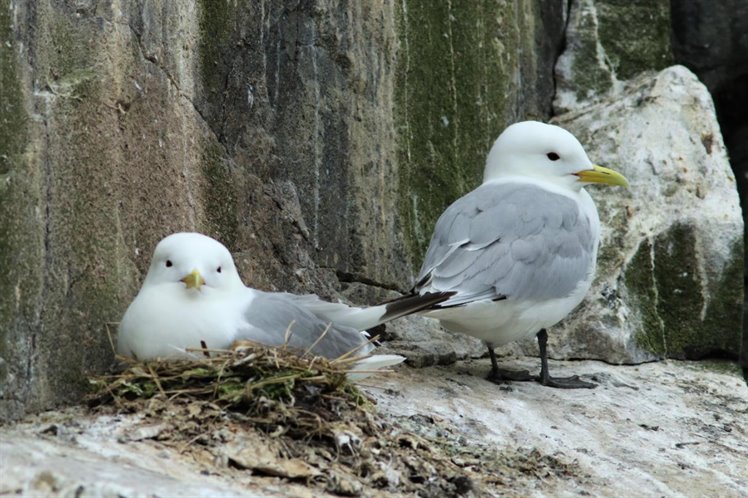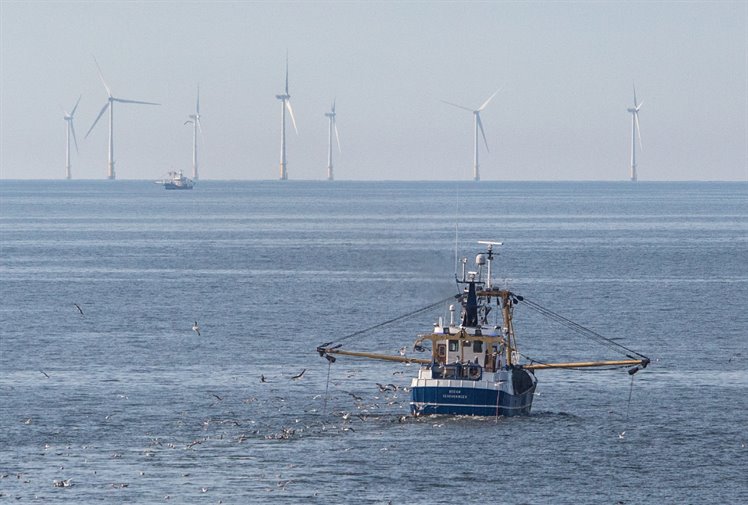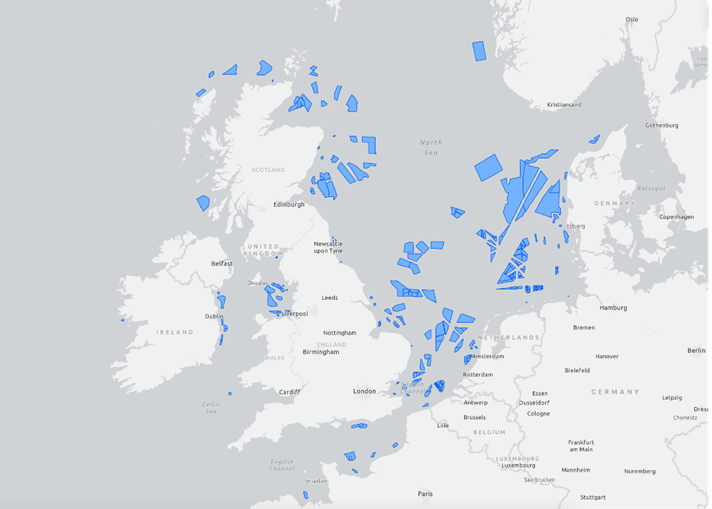International
There are great international ambitions for the development of wind energy on the North Sea. Given the many different interests at play on the North Sea and the fact that, in many cases, those interests do not stop at national borders, the countries of the North Sea are seeking cooperation with each other.
To get a better idea of the spatial impact of the international ambitions for wind energy on the North Sea, the countries of the North Sea have mapped out their plans for offshore wind energy up to 2030. It is expected that in 2030 these plans will have led to a quadrupling of the capacity generated by wind farms on the North Sea as a whole in relation to the 2022 situation. National and EU-level ambitions for 2050 are even heading towards a ten-fold increase in installed power, compared with 2022. From 26 GW in 2022, to 117 in 2030, and approaching 300 GW in 2050.
Spatial planning on the North Sea
There is limited space available on the North Sea. It is a real puzzle where, ultimately, to locate wind farm zones. When considering the location of wind farm zones, many factors play a role including affordability, the energy yield and the effects on aspects such as shipping, oil and gas production, nature and the fisheries. The spatial tensions on the North Sea are increasingly gaining an international character. If the North Sea countries are to be able to achieve their ambitions safely and responsibly, then international cooperation is of paramount importance. One of the issues relating to this cooperation is spatial planning.

Ecology
Another important topic in international cooperation, one that also has a bearing on spatial planning, is ecology. Many species migrate over large areas; national borders have no meaning in that respect. During their annual migration, birds and marine mammals but also, for instance, certain species of bat are confronted with offshore wind farms operated by various North Sea countries.

Shipping and fisheries
Shipping and fisheries are also faced with operations outside national borders. Vessels on the North Sea travel through several Exclusive Economic Zones (EEZs) and have to deal with a growing number of wind farms that they confront on their voyages. Fishers explore rich fishing grounds spread over the North Sea and the surrounding area, where this is allowed by agreements in the EU Common Fisheries Policy. In those areas, they are increasingly confronted with restrictions from the development of offshore wind farms that are often inaccessible to the fishing fleet. International agreements are also essential for these sectors.

What is already being done?
NSEC
In 2016, the North Seas Energy Cooperation (NSEC), a partnership of the energy ministers of the North Sea (and Irish Sea) countries was founded, with the aim of jointly promoting the development of offshore renewable energy, making cost savings and using space efficiently. The participating members are Belgium, Denmark, France, Germany, Ireland, Luxembourg, the Netherlands, Norway, Sweden and the European Commission. As a consequence of Brexit, the United Kingdom has a separate status within this cooperative structure, based on the NSEC-UK Memorandum of Understanding.
There are four working groups within NSEC. The Netherlands is (jointly) coordinator of two NSEC working groups:
- Spatial planning and ecology. Rijkswaterstaat fulfils the coordinating role on behalf of the Ministry of Climate Policy and Green Growth (formerly the Ministry of Economic Affairs and Climate Policy).
- Long-term grid and infrastructure planning. The Ministry of Climate Policy and Green Growth leads this working group together with Belgium.
The NSEC chair is in the hands of the European Commission and one NSEC member that rotates each year. In 2023, the Netherlands was chairing the NSEC.
The Netherlands hosted a ministers' conference on 20 November 2023 in the Netherlands, in relation to cooperation on the North Sea. Agenda points included the strengthening of cooperation on a number of issues, with proposals for concrete action:
- The energy system of the future, with attention for the offshore grid, the role of hydrogen, offshore hubs, ports and security of the infrastructure;
- Space and biodiversity, with attention for the sum of effects regarding maritime borders;
- Sustainable supply chain with attention for ports, use of materials, reuse and corporate social responsibility.
OSPAR
The name OSPAR comes from the combination of two earlier conventions, concluded in Oslo and Paris respectively. In full, OSPAR is the Convention for the Protection of the Marine Environment of the North-East Atlantic.
For the Netherlands, the convention is of great importance for regulating international coordination on environment and nature policy for the North Sea. It is a platform on which the countries of the North Sea can coordinate their substantive assessment of the marine environment, together and with other countries from the convention area, drawing conclusions for the use of the North Sea.
Various thematic committees and working groups within OSPAR pave the way for coordination at regional level, among other things. The Netherlands is active in several of these groups.
In 2022, at the initiative of the Netherlands, a working group was initiated to work on the development of recommendations, measures and actions to minimise negative cumulative ecological consequences of aspects including the development of offshore wind farms. The working group is starting by tackling the effects on birds, before widening its remit in 2024.
The Netherlands, together with the United Kingdom and Sweden, is the coordinator of this working group. Rijkswaterstaat fulfils this coordinating role on behalf of the Netherlands, and the Ministry of Infrastructure and Water Management.
For more information, go to the OSPAR convention website.
Share this
Documents

- Spatial study North Seas 2030 – offshore wind development
- Optimising offshore wind at the ecosystem scale (pdf, 2 MB)
- Mitigation offshore and ecology poster (pdf, 2.3 MB)
- Quick scan of cumulative impacts on the North Sea biodiversity (pdf, 13 MB)
- Quick scan of effects from large upscaling of offshore wind (part B) (pdf, 2.2 MB)
- Quick scan of opportunities for nature enhancement from OW (part C) (pdf, 1.3 MB)
- Exploration of potential collaboration on preventive, mitigation and compensation measures (pdf, 1.6 MB)